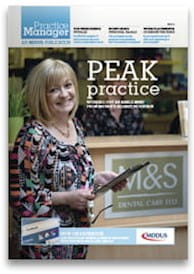
JUST as online engagement has become ever more ubiquitous in society so too has MDDUS seen an increase in advice calls from both medical and dental practices regarding the use of social media to communicate with patients.
Often members want to talk through the potential risks associated with setting up and managing a practice Facebook page or Twitter feed to help them engage more proactively with patients – sharing news about the service or advice about common or seasonal illnesses or promoting local healthcare initiatives.
A significant number also contact us asking for advice on how to respond to breaches of confidentiality or to damaging public comments about the practice (or members of the practice team) on existing sites. In our experience it is much better to contact us at an early stage for advice on how to deal with these situations as they can escalate quickly, with practices sometimes threatening to remove patients from their list and then faced with increasing reputational damage.
Done in a considered way, though, there are real benefits to engaging with patients via social media. For example, there is evidence that communicating about the impact of DNAs via Facebook can reduce the number of lost appointments. Providing information about access to services or advice on how to deal with minor illnesses/ seasonal conditions can reduce the number of calls to the practice. Many practices also use specialised subpages to increase the level of support provided to specific groups of patients, such as asthma sufferers or those needing to lose weight.
Problems mostly arise due to a lack of planning and care when setting up an online presence for the practice and below are some pitfalls to avoid.
HAVE A CLEAR PURPOSE
Be clear about the purpose of using social media for your practice.
Most social media users cite "gaining useful information about the service" and "to receive information which might be relevant to their interests" when asked why they subscribe to services to receive notifications. Believe it or not, complaining and providing feedback are not usually listed.
So it is probably best to use social media as a positive way to communicate with patients – that is, to "push" information about services or advice that might be relevant to patients – rather than as a means to obtain feedback about your service.
You should consider whether you want patients to be able to clarify information in posts via comments or to add useful pointers or support for other patients to access. There are risks associated with allowing patient engagement on your page, however these can be mostly mitigated by ensuring your privacy settings are tightly controlled and having all posts viewed or moderated quickly so that any emerging problems can be avoided or resolved professionally.
Bear in mind that this means that you will need to have a group of administrators trained and ready to respond.
HAVE A SOCIAL MEDIA POLICY IN PLACE
Most practices will already have adopted a social media policy for staff which might include rules around what is acceptable use in and outside the workplace. It will probably include statements about the importance of protecting confidentiality in personal use of social media and not bringing the practice into disrepute.
There is also clear, professional guidance from the GMC, GDC and the Nursing and Midwifery Council on use of social media and so clinicians should be aware of their personal responsibilities – particularly in relation to confidentiality, maintaining professionalism and protecting patients.
Problems mostly arise due to a lack of planning and care when setting up an online presence for the practice
When considering whether to create a social media presence for the practice, or when reviewing your current online practices, it is important that similar rules and processes exist for page administrators. These should include:
- Clear guidance on what types of posts can be created or shared.
- Clear guidance on who can post or share posts to the practice pages.
- Any necessary authorisation from a GP, dentist or practice manager before an item is posted or shared.
- Agreeing what posts/pages are acceptable to share from a health advice point of view – e.g. sticking to a set of agreed NHS pages, such NHS Choices or a reputable health news source.
- Ensuring regulatory guidance is complied with if you are engaged in advertising. Social media sites can be used to advertise your practice but all content should comply with good practice on advertising. For example, in Good medical practice the GMC states: "When advertising your services, you must make sure the information you publish is factual and can be checked, and does not exploit patients’ vulnerability or lack of medical knowledge". The GDC has similar statements within their Standards for the dental team.
- Checking to ensure that posts are not discriminatory or offensive (while "funnies" may be engaging, some patients may find them offensive).
- Setting standards for the regularity of posts.
- Determining availability to provide responses and the standards for moderation of comments or posts (e.g. all comments/posts to be moderated within two hours).
- Providing guidance on how patient comments will be responded to and the types of posts or content that should be disallowed or raised with senior colleagues.
SET OUT RULES FOR FOLLOWERS
Facebook is the most popular vehicle for practices as it reportedly has twice the number of users than Twitter. No matter which platform you use, be clear in your 'About' description on the purpose of the pages. This might include a statement that the pages are designed to help patients stay up-to-date with what services are available at your practice, how to access these services and any relevant advice or seasonal health information.
Make it clear also what the pages are not designed to do. Remind patients that the practice welcomes feedback about the service but that this is best raised via the most appropriate channel. Include a statement about the importance of patient confidentiality and provide contact details if patients wish to provide feedback or raise a complaint.
Patients should be advised to apply caution if they comment on the site, as anyone can see their comments. In particular, no comments should be made which involve the experiences of third parties, to avoid breaching confidentiality.
Information on availability (and responsiveness if this is appropriate) within practice opening hours is also important, along with a link to your practice website where more detailed information can be found.
MANAGING PATIENT COMMENTS AND FEEDBACK
Practices can choose to set their privacy settings to "no tagging" and "no comments". This means you lose some of the benefits of engagement but that the risks are dramatically reduced. If you so decide to allow patients to comment or post on your site, it is important to ensure that your administrators are set up (and have enough time) to access and deal with notifications of these.
Consider how you will deal with critical comments in advance and have a process/script to respond to any negative posts. Consider your responsibility to other patients and as an employer.
Explain why in your ‘About’ section if you allow posts or comments only after moderation. Ensure posts are assessed quickly and, if not authorised, the person is provided with an explanation and offer an alternative mechanism of communication to offset any frustration. Ensuring that comments are allowed but moderated prevents conversations starting on any practice posts, which can sometimes become problematic.
RISK CHECKLIST: SOCIAL MEDIA ENGAGEMENT
- Consider the purpose carefully and get it right for your practice.
- Consider whether you have the capability and capacity to manage your online presence effectively.
- Consider whether and how you wish patients to be able to engage with the practice online.
- Take time to identify, consider and take steps to mitigate risks.
- Remember that social media posts should be simply another way to demonstrate the professionalism of the practice.
Liz Price is a senior risk adviser at MDDUS
This page was correct at the time of publication. Any guidance is intended as general guidance for members only. If you are a member and need specific advice relating to your own circumstances, please contact one of our advisers.
Read more from this issue of Practice Manager

Save this article
Save this article to a list of favourite articles which members can access in their account.
Save to library